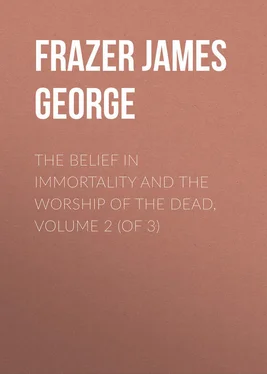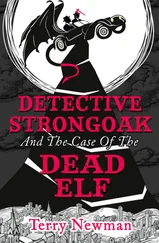James Frazer - The Belief in Immortality and the Worship of the Dead, Volume 2 (of 3)
Здесь есть возможность читать онлайн «James Frazer - The Belief in Immortality and the Worship of the Dead, Volume 2 (of 3)» — ознакомительный отрывок электронной книги совершенно бесплатно, а после прочтения отрывка купить полную версию. В некоторых случаях можно слушать аудио, скачать через торрент в формате fb2 и присутствует краткое содержание. Жанр: foreign_antique, foreign_prose, на английском языке. Описание произведения, (предисловие) а так же отзывы посетителей доступны на портале библиотеки ЛибКат.
- Название:The Belief in Immortality and the Worship of the Dead, Volume 2 (of 3)
- Автор:
- Жанр:
- Год:неизвестен
- ISBN:нет данных
- Рейтинг книги:3 / 5. Голосов: 1
-
Избранное:Добавить в избранное
- Отзывы:
-
Ваша оценка:
- 60
- 1
- 2
- 3
- 4
- 5
The Belief in Immortality and the Worship of the Dead, Volume 2 (of 3): краткое содержание, описание и аннотация
Предлагаем к чтению аннотацию, описание, краткое содержание или предисловие (зависит от того, что написал сам автор книги «The Belief in Immortality and the Worship of the Dead, Volume 2 (of 3)»). Если вы не нашли необходимую информацию о книге — напишите в комментариях, мы постараемся отыскать её.
The Belief in Immortality and the Worship of the Dead, Volume 2 (of 3) — читать онлайн ознакомительный отрывок
Ниже представлен текст книги, разбитый по страницам. Система сохранения места последней прочитанной страницы, позволяет с удобством читать онлайн бесплатно книгу «The Belief in Immortality and the Worship of the Dead, Volume 2 (of 3)», без необходимости каждый раз заново искать на чём Вы остановились. Поставьте закладку, и сможете в любой момент перейти на страницу, на которой закончили чтение.
Интервал:
Закладка:
The head of a chief was always and at all times deemed most sacred, and in consequence he might not even touch it with his own hand; if he chanced to commit the sacrilege, he was obliged at once to apply his fingers to his sacred nose and to snuff up the odour of sanctity which they had abstracted, thus restoring the holy effluvium to the place from which it had been taken. 109 109 W. Yate, An Account of New Zealand , p. 87; R. Taylor, Te Ika A Maui , p. 165.
For the same reason the cutting of a chief's hair was a most difficult and delicate operation. While it lasted neither the great man himself nor the barber who operated on him was allowed to do anything or partake of any food except under the restrictions imposed on all sacred or tabooed persons; to use the scissors or the shell, with which the operation was performed, for any other purpose or any other person would have been a terrible profanation of sacred things, and would have rendered the rash sacrilegious wretch, who had dared so to appropriate it, liable to the severest punishment. The severed hair was collected and buried or hung up on a tree, 110 110 W. Yate, An Account of New Zealand , p. 87; E. Dieffenbach, Travels in New Zealand , ii. 104.
probably to put it out of the way of common folk, who might have been struck dead by contact with the holy locks. But apparently the dangers incident to hair-cutting were by no means confined to chiefs, but extended to any one who was bold enough to submit his head to the barber's shears; for one of the early writers on the Maoris tells us that "he who has had his hair cut is in the immediate charge of the Atua ; he is removed from the contact and society of his family and his tribe; he dare not touch his food himself; it is put into his mouth by another person; nor can he for some days resume his accustomed occupations, or associate with his fellow-men." 111 111 Richard A. Cruise, Journal of a Ten Months' Residence in New Zealand (London, 1823), pp. 283 sq. Compare J. Dumont d'Urville, Voyage autour du Monde et à la recherche de la Pérouse, Histoire du Voyage (Paris, 1832-1833), ii. 533.
The hair of the first-born of a family in particular, on account of his extreme sanctity, might be cut by nobody but a priest; and for many days after the operation had been performed the priestly barber was in a state of strict taboo. He could do nothing for himself, and might not go near anybody. He might not touch food with his hands, and no less than three persons were required to feed him. One of them prepared the food at a safe distance, took it to a certain place, and retired; a second came forward, picked up the victuals, carried them to another spot and left them; finally, a third, venturing into the danger zone, actually brought the food to the priest and put it into his mouth. 112 112 Elsdon Best, "Maori Religion," Report of the Twelfth Meeting of the Australasian Association for the Advancement of Science, held at Brisbane, 1909 , p. 463.
The atmosphere of taboo or sanctity which thus surrounded Maori chiefs and gentlemen not only imposed many troublesome and inconvenient restraints on the men themselves, it was also frequently a source of very real danger, loss, and annoyance to other people. For example, it was a rule that a chief should not blow on a fire with his mouth, because his breath being sacred would communicate its sanctity to the fire, and if a slave or a common man afterwards cooked food at the fire or merely took a brand from it, the chief's holiness would cause that man's death. 113 113 R. Taylor, Te Ika A Maui , p. 165.
Again, if the blood of a high chief flowed on anything, though it were but a single drop, it rendered the thing sacred to him, so that it could be used by nobody else. Thus it once happened that a party of natives came in a fine new canoe to pay their respects to an eminent chief; the great man stepped into the canoe, and in doing so he chanced to strike a splinter into his foot, which bled. That sufficed to consecrate the canoe to him. The owner at once leaped out, drew the canoe ashore opposite to the chief's house and left it there. 114 114 E. Dieffenbach, Travels in New Zealand , ii. 101; R. Taylor, Te Ika A Maui , pp. 164 sq.
Again, a Maori gentleman, visiting a missionary, knocked his head against a beam in the house, and his sacred blood was spilt. The natives present thereupon told the missionary that in former times his house would after such an accident have belonged to his noble visitor. 115 115 R. Taylor, Te Ika A Maui , p. 165.
Even the cast garments of a chief had acquired, by contact with his holy body, so virulent a degree of sanctity that they would kill anybody else who might happen in ignorance to find and wear them. On a journey, when a chief found his blanket too heavy to carry, he has been known to throw it very considerately down a precipice where nobody would be likely to light on it, lest some future traveller should be struck dead by appropriating the sacred garment. Once a chief's lost tinder-box actually caused the death of several persons; for having found it and used it to light their pipes, they literally died of fright on learning the sacrilege which they had committed. 116 116 R. Taylor, Te Ika A Maui , pp. 164 sq.
Such fatal effects consequent on the discovery of a breach of taboo were not uncommon among the Maoris. For instance, a woman once ate some peaches which, though she did not know it, had been taken from a tabooed place. As soon as she heard where the fruit had come from, the basket which she was carrying dropped from her hands, and she exclaimed in agony that the spirit ( atua ) of the chief whose sanctuary had thus been profaned would kill her. That happened in the afternoon, and next day by twelve o'clock she was dead. 117 117 W. Brown, New Zealand and its Aborigines (London, 1845), p. 76.
Again, a slave, a strong man in the prime of life, once found the remains of a chief's dinner beside the road, and being hungry ate it up without asking any questions. No sooner, however, did he hear to whom the food had belonged than he was seized with the most extraordinary convulsions and cramps in the stomach, which never ceased till he died about sundown the same day. The English eyewitness who reports the case adds, that any European freethinker who should have denied that the man was killed by the chief's taboo would have been listened to by the Maoris with feelings of contempt for his ignorance and inability to understand plain and direct evidence. 118 118 Old New Zealand , by a Pakeha Maori, pp. 95-97.
In order that a thing should be consecrated or tabooed to the exclusive use and possession of a chief, it was not necessary that his sacred blood should flow on it, or that he should merely touch it; he had only to call it his head, or his back-bone, or any other part of his body, and at once the thing, by a legal fiction, became his and might be appropriated by nobody else under pain of violating the taboo which the chief had laid upon it. For example, when a chief desired to prevent a piece of ground from being cultivated by any one but himself, he often resorted to the expedient of calling it his back-bone; after that if any man dared to set foot on the land so consecrated, the transgression was equivalent to a declaration of war. In this simple and easy fashion a chief might acquire anything that took his fancy from an axe or a canoe to a landed estate, and the rightful owner of the property dared not complain nor dispute the claim of his superior. 119 119 E. Shortland, Traditions and Superstitions of the New Zealanders , p. 111; Old New Zealand , by a Pakeha Maori, pp. 137 sqq. ; R. Taylor, Te Ika A Maui , p. 168.
Nevertheless in daily life even ordinary people used the taboo to secure their property or to acquire for themselves what had hitherto been common to all. For example, if a man found a piece of drift timber, he could make it his own by tying something to it or giving it a chop with his axe; he thereby set his taboo on the log, and as a general rule the taboo would be respected. Again, with a simple piece of flax he might bar the door of his house or his store of food; the contents of the house or store were thus rendered inviolable, nobody would meddle with them. 120 120 R. Taylor, Te Ika A Maui , p. 171.
Интервал:
Закладка:
Похожие книги на «The Belief in Immortality and the Worship of the Dead, Volume 2 (of 3)»
Представляем Вашему вниманию похожие книги на «The Belief in Immortality and the Worship of the Dead, Volume 2 (of 3)» списком для выбора. Мы отобрали схожую по названию и смыслу литературу в надежде предоставить читателям больше вариантов отыскать новые, интересные, ещё непрочитанные произведения.
Обсуждение, отзывы о книге «The Belief in Immortality and the Worship of the Dead, Volume 2 (of 3)» и просто собственные мнения читателей. Оставьте ваши комментарии, напишите, что Вы думаете о произведении, его смысле или главных героях. Укажите что конкретно понравилось, а что нет, и почему Вы так считаете.











